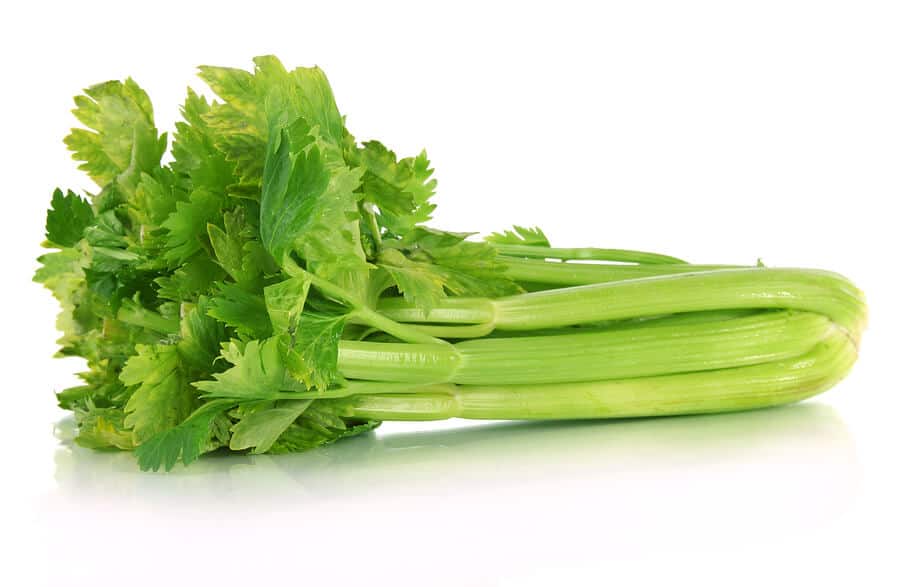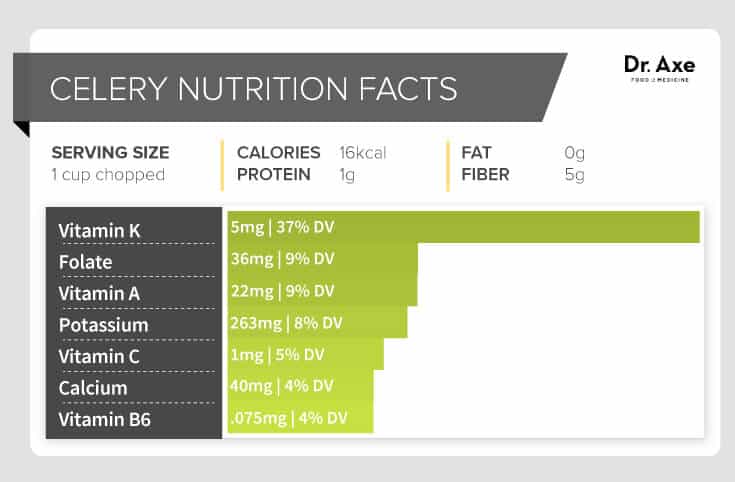10 Surprising Health Benefits of Celery
Celery, which has the scientific name Apium graveolens, is a vegetable in the plant family called Apiaceae. The benefits of celery begin with it being an excellent source of antioxidants and beneficial enzymes, in addition to vitamins and minerals such as vitamin K, vitamin C, potassium, folate and vitamin B6.
Administered as an anti-hypertensive agent in folk medicine for centuries, celery continues to prove that there are many cardiovascular benefits. In recent pharmacological studies, celery demonstrates both antioxidant and anti-inflammatory activities that help improve blood pressure and cholesterol levels, as well as prevent heart disease.
Celery also provides dietary fiber – especially when you eat more than one cup at a time – that boosts digestion and weight loss. In addition, celery’s high percentage of water and electrolytes can prevent dehydration, and special compounds help celery to act as a diuretic and reduce bloating. As a supplier of antioxidant flavonoids and polyphenol phytonutrients, other significant benefits of celery include its ability to improve liver, skin, eye and cognitive health.
Benefits of Celery, Plus Nutrition Facts and Recipes
Most people choose to eat celery stalks, but the leaves and seeds of celery are also edible and beneficial. For example, celery leaves make a great addition to stir-fries and soups.
Celery seeds — which can be found either in whole seed form, extract form or ground-up — have impressive health benefits on their own, as they help to lower inflammation and to fight bacterial infections. In some parts of the world, celery is grown primarily for its beneficial seeds, which are actually a very small type of fruit. Celery seeds are commonly used as a spice when crushed and contain a special oily compound called apiol that is used as a flavoring agent and for its many medicinal uses.
Celery Nutrition Facts
One cup of chopped celery has: (1)
(percentages based on the RDA for adult women)
- 16 calories
- 0 fat
- 1 gram of protein
- 5 grams of fiber
- 5 milligrams vitamin K (37%)
- 36 milligrams folate (9%)
- 22 milligrams vitamin A (9%)
- 263 milligrams potassium (8%)
- 1 milligrams vitamin C (5%)
- 40 milligrams calcium (4%)
- 0.08 milligrams vitamin B6 (4%)
Top Health Benefits of Celery
1. Helps Lower High Cholesterol
Benefits of celery include its cholesterol-lowering power that make it useful for improving or maintaining heart health. Celery contains a unique compound called 3-n-butylphthalide (BuPh) that has previously been reported to have lipid-lowering action, but researchers believe celery has many other other beneficial compounds that are still emerging in research.
In a study conducted by the Department of Pharmacology at the University of Singapore, when rats were fed a high-fat diet for eight weeks, rats that had been given celery extract showed significantly lower levels of lipids in their blood compared to the control group of rats that didn’t receive celery extract. (2)
The group supplementing with celery extract experienced a beneficial reduction in serum total cholesterol (TC), low density lipoprotein cholesterol (LDL-C) and triglyceride (TG) concentrations.
2. Lowers Inflammation
Celery contains antioxidants and polysaccharides that are known to act as anti-inflammatories, especially flavonoid and polyphenol antioxidants. These support overall health, especially as someone ages, by fighting free-radical damage (or oxidative stress) that can lead to inflammation. Inflammation is often a contributing cause of chronic diseases like cancer, heart disease, arthritis and many more.
Researchers have identified over a dozen different types of antioxidants that are responsible for the benefits of celery — these include such phenolic acids as caffeic acid and ferulic acid, plus flavaols like quecetin. This makes celery useful for treating a wide range of conditions that are made worse by inflammation: joint pain (such as from arthritis), gout, kidney and liver infections, skin disorders, irritable bowel syndrome and urinary tract infections, just to name a few.
3. Helps Prevent or Treat High Blood Pressure
Celery seed extracts have anti-hypertensive properties that help reduce high blood pressure, one of the important risk factors for coronary heart disease that is the largest cause of mortality in industrial countries.
Benefits of celery seeds include potentially helping to control chronic elevated blood pressure levels. (3) The blood pressure-lowering benefits of celery come from its seeds, which contain hexanic, methanolic, and aqueous-ethanolic extracts that improve circulation, lower inflammation and help control blood pressure.
When rats were given celery seed extract over a seven-week period, they experienced significant improvements in blood pressure levels compared to rats being fed the same diet but not receiving celery extract. It’s believed that celery helps lower high blood pressure by acting as a smooth muscle relaxant and improving the flow of calcium and potassium into and out of cells. Celery extract helps blood vessels to expand and contract, improve blood flow, and aid in overall heart health.
4. Helps Prevent Ulcers
Here’s one of the benefits of celery you may not have known about: It can help prevent or reduce the formation of painful ulcers. A 2010 study published in the Journal of Pharmaceutical Biology found that celery contains a special type of ethanol extract that is useful in protecting the lining of the digestive tract from ulcers. Celery extract has the ability to significantly replenish depleted levels of gastric mucus that is needed in the stomach lining to prevent tiny holes and openings from forming.
Researchers believe celery nourishes the stomach, colon and intestines due to the presence of chemical constituents such as flavonoids, tannins, volatile oils and alkaloids that control the level of gastric acid released while also improving the level of protective mucus. (4)
5. Protects Liver Health
When researchers from the Department of Nutrition and Food Science at Helwan University in Egypt fed rats celery (along with chicory and barley), these rats experienced a reduction in the amount of dangerous fat buildup within the liver.
Precisely, when researchers supplemented the high-cholesterol diets of rats with celery, chicory and barley powder, they observed an improvement in liver enzyme function and blood lipid levels. The more celery, chicory and barley the rats were given, the more their liver health improved. This suggests that a diet high in celery, as well as chicory and barley, can be beneficial for people suffering from liver disease. (5)
6. Beneficial for Weight Loss
Celery is extremely low in calories and can be a valuable food to help you lose weight because of its ability to provide vital nutrients and to help regulate lipid (fat) metabolism. One of the major benefits of celery is that it’s so nutrient-dense, meaning it provides antioxidants, electrolytes, vitamins and minerals like vitamin C, B vitamins and potassium – all with very little calories.
7. Boosts Digestion and Reduces Bloating
Celery seeds contain an odorless and oily compound known as NBP that has a diuretic effect and helps the body to detox. In studies involving rats, urine volume was significantly greater when rats were given celery extract compared to a control group. (6)
The digestive benefits of celery are partly due to its diuretic effect. This could also be one of the possible anti-hypertensive mechanisms of celery seeds that helps to lower blood pressure. Because it improves circulation within the intestines, it’s also useful for improving digestion by helping to relieve bloating and puffiness from water retention.
8. Contains Anti-Microbial Properties That Fight Infections
Celery seeds have actually been used for centuries as an herbal medicine with reported antibacterial effects. A 2009 report published in the Journal of Pharmacy and Pharmacology shows that celery contains special anti-microbial components found in the seeds of the celery plant. (7)
When extract was taken from celery seeds and combined with harmful bacteria compounds that cause infection in humans, the celery extract was able to significantly purify and reduce the bacteria’s growth, suggesting celery can be used to naturally boost immunity and fight bacterial infections.
9. Helps Prevent Urinary Tract Infections
Because celery helps to reduce uric acid and stimulates urine production, it’s beneficial for fighting bacterial infections within the digestive tract and reproductive organs. Similarly to cranberries that are known for fighting urinary tract infections (UTIs), celery can help prevent such UTIs, as well as bladder disorders, kidney problems and possibly even cysts on reproductive organs.
10. May Help Protect from Cancer
Another one of the important benefits of celery? It’s in the same plant family as cancer-protective vegetables like carrots, celery, fennel, parsley and parsnips, which all contain chemo-protective compounds called polyacetylenes. Early studies have shown that polyacetylenes help reduce toxicity and fight against cancer formation, specifically breast cancer, intestinal cancer and leukemia.
Polyacetlynes have many immune-boosting effects, including tumor-fighting abilities that stop mutated cells from proliferating. According to faculty of the Department of Agricultural Sciences at the Aarhus University of Denmark, “polyacetylenes have shown many interesting bioactivities including anti-inflammatory, antiplatelet-aggregatory, cytotoxic, antitumor activity, as well as activity against bacteria and mycoplasma.” (8)
Celery’s History
Celery is an extremely old vegetable, with records showing that celery leaves were part of the remains found in the tomb of pharaoh “King Tutankhamun,” who died in 1323 BC. In ancient Greece, celery leaves were used as garlands for the dead and to make wreaths or crowns that were given to winners of battles. Celery is even mentioned in Homer’s Iliad and The Odyssey; horses were said to grow on wild celery that grew throughout Troy.
In the past, celery was grown as a vegetable mostly during the winter and early spring months. People liked to eat celery to help with “cleansing” and believed that celery acted as a natural detox tonic that could prevent sickness. Celery seeds were also used to help relieve pain.
How to Buy and Store Celery
Today, in North America, the type of celery most grown and eaten is called “pascal celery,” while in Europe “celeriac” celery is more popular. Celery is considered a long season crop and somewhat hard to grow, since it needs constant moisture and can’t withstand heat very well. It grows in cool, moist climates best and can be found most times of the year, especially during the fall through winter months.
Knowing that celery is one of the most chemical-sprayed vegetables there is, always look for organic celery whenever possible to get the most benefits of celery without consuming toxins and chemicals. The Environmental Working Group’s 2014 report shows that celery is usually sprayed with multiple types of pesticides and is on the list of the “Dirty Dozen” fruits and vegetables that contain the most pesticide-residues. (9)
When picking out celery, make sure the stalks seem firm and aren’t too limber. If the stalks have their leaves attached still, look for brightly colored leaves that are not wilting.
Don’t wash celery right away after bringing it home because this can cause it go bad quicker. Store dry celery, wrapped in a paper towel if you’d like, inside the refrigerator for about 5–7 days at the most. After this time, celery tends to get limp and its nutrient content starts to decrease. It’s also not recommended to freeze celery because it easily wilts and will become mushy once defrosting it.
To clean and cut celery, discard the base that’s usually firm and white. You can save the leaves and use these in recipes, such as soups or a sauté. Celery leaves are a good source of vitamins and minerals just like the stalks, so don’t waste them! Rinse the celery stalks and leaves well to remove any dirt of lingering pesticide spray and then cut the stalks into pieces.






No comments:
Post a Comment